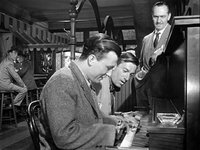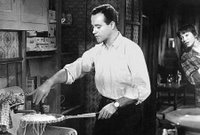 Here's the Siren's list of the Best of the Best Picture Oscars, for Edward Copeland's latest survey. You have until midnight tonight (May 5) to mail your selections to eddiesworst@yahoo.com. The only way the Siren could compile this list was by going with the Best Picture Oscar winners than she liked best--the ones she would gladly watch again tonight. In order, then:
Here's the Siren's list of the Best of the Best Picture Oscars, for Edward Copeland's latest survey. You have until midnight tonight (May 5) to mail your selections to eddiesworst@yahoo.com. The only way the Siren could compile this list was by going with the Best Picture Oscar winners than she liked best--the ones she would gladly watch again tonight. In order, then:1. The Best Years of Our Lives. Peerless portrait of American family life. Not a weak performance in the movie. Full of moments to treasure, such as Myrna Loy's wordless reaction when she finally sees her husband, or Fredric March, contrasting a prewar picture of himself with the image in the mirror. And there's Harold Russell's homecoming to his family and his "swell girl" Wilma, as moving a scene as any Wyler ever filmed--and the prelude, as Dana Andrews watches Russell walk away and says sadly, "I hope Wilma is a swell girl." The movie is sometimes described as idealized, but the Siren absolutely disagrees. Virginia Mayo's trampy wife, Myrna Loy's expression while watching her husband drink too much, Russell's mother suppressing a gasp when she sees the hooks that have replaced her son's hands, Dana Andrews suffering what we'd now call PTSD--none of this is treated with anything near treacly sentiment.
2. The Bridge on the River Kwai. Most people seem to prefer Lawrence of Arabia to this earlier David Lean epic. Lawrence is a magnificent movie, but the Siren gives the edge to The Bridge, for its clearer and more pungent characterizations, its biting antiwar and anti-imperialist message and its satiric edge.
 3. The Apartment. Next to The Crowd (a clear influence), the Wilder movie is the premiere meditation on surviving as a cog in the capitalist machinery, a theme that is notably under-explored in American film. Office Space can't hold a candle to the honesty and wit of this movie.
3. The Apartment. Next to The Crowd (a clear influence), the Wilder movie is the premiere meditation on surviving as a cog in the capitalist machinery, a theme that is notably under-explored in American film. Office Space can't hold a candle to the honesty and wit of this movie.4. Annie Hall. The Siren knows some people don't like this movie, but it's like telling her you don't like ice cream. Doesn't compute. I particularly love Diane Keaton's and Woody Allen's split-screen shrink session when, asked how often they have sex, Keaton blurts "All the time. Twice a week!" and Allen laments, "Practically never. Twice a week."
5. All About Eve. Wordplay that remains unsurpassed more than a half-century after the movie was released.
6. The Godfather Part II. The Godfather movies began our fatuous romanticization of the Mob's vicious criminals, and therefore have a great deal to answer for. (The Siren agrees wholeheartedly with whoever was first to observe that The Godfather shows the Mafia the way they want to think of themselves, but the real Mobsters are the casually homicidal sadists of Goodfellas.) The first Godfather is perhaps more purely entertaining, but it's the second film that shows the escalating costs of violence. When Michael Corleone asks his mother whether it's possible to lose your family (Mr. Campaspe's favorite scene), she can't comprehend what he's talking about. It isn't possible, she tells him--but by that time, the audience knows it is not only possible, for Michael it is inevitable.

7. An American in Paris. Oh well, every list should have an item calculated to start an argument. This gorgeous musical occupies an odd position, beloved yet often called overrated. The final ballet sequence, with its dancers echoing French painters from Monet to Lautrec, gets a lot of eye-rolling from some modern audiences. Piffle, says the Siren. Remember, Gene Kelly's character is a struggling artist. That his fantasy sequence would be overrun with more talented painters is as logical as anything in an MGM musical ever gets. The ballet certainly makes as much sense as the "Louisiana Hayride" number in The Band Wagon (a film the Siren also loves, natch). And if Kelly and Leslie Caron on the banks of the Seine fail to enchant, the Siren thinks you should come clean and admit you just don't like musicals.
8. Unforgiven. A grimmer and more violent pendant to The Man Who Shot Liberty Valance. Like its predecessor, this movie asks the audience to look at how we know what we think we know about our heros and our history.
9. Rebecca. It's the atmosphere that makes this one so marvelous.
10. How Green Was My Valley. Yes, yes, yes, Citizen Kane should have won. That doesn't mean this exquisitely beautiful movie, more lyrical and heartfelt than any other John Ford made, should be overlooked. Roddy MacDowell gives perhaps the greatest child performance of all time, and Maureen O'Hara was never again as simple, direct and true as she was playing Angharad. In her memoirs she said that when the Welsh choir, hired to sing in a couple of sequences, saw Ford's set, its beauty made them burst into tears.
(Above left, Gregg Toland's deep focus for The Best Years of Our Lives turns a dingy bar into art. Middle right, Jack Lemmon demonstrates the movies' best-ever use of a tennis racket--although years later, Annie Hall came in a close second. Bottom left, Gene Kelly is menaced by showgirls in Paris. Perhaps they just wanted no more of his perfectionist rehearsals.)
Không có nhận xét nào:
Đăng nhận xét